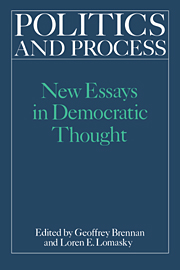Book contents
- Frontmatter
- Contents
- Acknowledgments
- List of contributors
- Introduction
- Chapter 1 The justification of democracy
- Chapter 2 Large numbers, small costs: the uneasy foundations of democratic rule
- Chapter 3 Evaluating the institutions of liberal democracy
- Chapter 4 Democracy: the public choice approach
- Chapter 5 The democratic order and public choice
- Chapter 6 Radical federalism: responsiveness, conflict, and efficiency
- Chapter 7 Contractarian presuppositions and democratic governance
- Chapter 8 In quest of the social contract
- Chapter 9 Rationality and the justification of democracy
- Chapter 10 The morality of democracy and the rule of law
- Index
Chapter 5 - The democratic order and public choice
Published online by Cambridge University Press: 29 September 2009
- Frontmatter
- Contents
- Acknowledgments
- List of contributors
- Introduction
- Chapter 1 The justification of democracy
- Chapter 2 Large numbers, small costs: the uneasy foundations of democratic rule
- Chapter 3 Evaluating the institutions of liberal democracy
- Chapter 4 Democracy: the public choice approach
- Chapter 5 The democratic order and public choice
- Chapter 6 Radical federalism: responsiveness, conflict, and efficiency
- Chapter 7 Contractarian presuppositions and democratic governance
- Chapter 8 In quest of the social contract
- Chapter 9 Rationality and the justification of democracy
- Chapter 10 The morality of democracy and the rule of law
- Index
Summary
Individual preferences, institutions, and public choice
Before the development of public-choice theory, normative writing about the public sector in general, and about democratic politics in particular, belonged to one of two broad categories. First, many critics defended or decried some particular public policy as advancing or denying the achievement of a just society, as they defined it. Both history and contemporary political life provide ample evidence of this kind of critical writing. For example, in earlier days advocates for and against slavery, the gold standard, progressive taxation, labor-union cartels, economic planning, and international isolationism dominated political discourse. And each advocate framed his argument in terms of fulfilling some vision of justice. Today many of the issues seem different, but as contemporary writers argue for or against a woman's right to have an abortion, a greater or lesser amount of income redistribution, or more or less government regulation of the private sector, the framing of argument in terms of justice, rights, and other deontological goals persists.
Second, other writers attacked or defended not the policies of government, but its structure, its organic laws, and the basis of representation, but again in terms of preconceived notions of justice or rights. Surely, such arguments are as old as the state.
- Type
- Chapter
- Information
- Politics and ProcessNew Essays in Democratic Thought, pp. 97 - 148Publisher: Cambridge University PressPrint publication year: 1989
- 7
- Cited by

